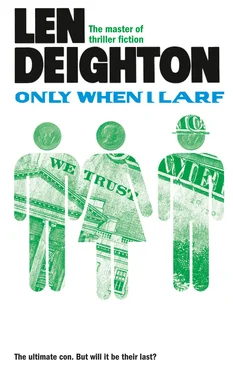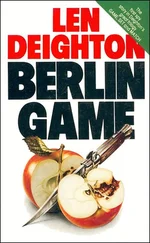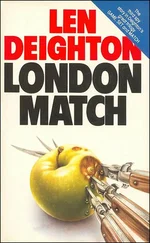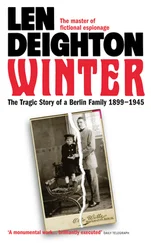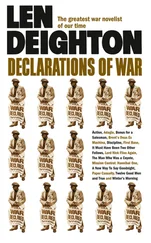‘O.K. chief,’ he said happily. ‘You are the C.O. now that Mason, Bertie, and Dusty Miller and Little have copped it.’
‘Yes,’ I said. ‘That makes me the senior officer.’
Leadbetter stared out through the tent flap for a long time, then he spoke again. ‘Old Mason must have guessed what we were heading into. I wondered why he left you here at HQ Squadron yesterday. The C.O. was a good old stick wasn’t he?’ I’d been reprimanded by the colonel only a few hours before, I could almost see him standing where Leadbetter now stood.
‘Yes,’ I said. ‘He was.’
Funny to think of Colonel Mason as the father of Liz. I wondered what he would have thought of both of us today. What would any of our fathers think of any of us? I wished my father had lived longer. I was only a child when he died, and I had never had a real chance to become his friend. He was a wise man, everyone agreed about that, and everyone had gone to him for advice. If only he had given me more. A reserved man, for no one knew how sick he was until it was too late; no one knew, not even my mother. I remembered being angry that he would not carry me home the day before he died. Poor father.
I was fond of Liz and Bob but I couldn’t really talk with them. If only there was someone to whom I could talk. Sometimes, truth to tell, I felt more at home in the homes and offices of the men we swindled, than in the clubs, bars, restaurants and international hotels where we spent our ill-gotten gains. It was merely a trick of fate that I was not, in reality, the President of Amalgamated Minerals or some similar concern in the world of international commerce. Or was it. Perhaps I was just fooling myself, as I was expert at fooling others. Perhaps I was just a criminal as my mother had once told me I was. ‘A hit and run driver,’ she had called me, banging into people’s lives and causing them pain and distress. She had been referring to the divorce and to the swindle in Frankfurt 1946. I came almost unscathed out of both, but as a prediction it was not too wide of the mark. I was a disappointment to her, after my dashing career in the army nothing was beyond my power, and precious little beyond my ambition.
Karl Poster, the tall thin mark. I had a feeling he wasn’t completely convinced at the very end. As I went out through the office door I had looked at him, and he had doubt written right across his face. I’d been worried that he’d follow me out of the building. What could we get. It’s hard to say, but if the city put up a really astute attorney there could be a dozen or more charges. Using that building as a site for a fraud was probably an offence, and then our fancy cheque was a forgery. Can you imagine ten years in prison. I’d never live through it your honour. Very well, says the judge, just do as much as you can of it. Very funny. Ten years, fifteen perhaps. Would an American prison be better than a British prison. I’d often thought of that. Central heating, running water, better food but more violence. Greater chance of being hurt by the other prisoners. Still I’d survived the war. I’d done a bloody sight more than survived it; I’d thrived on it. That’s why I’d never stopped fighting it. This was my war, and Liz and Bob were my army. Not much of an army, but then a commander has to adapt to his resources. That was the secret of command in battle; flexibility and full utilisation of resources. Terrain, men, weapons, skills and surprise. Now I was talking to myself as though I was a mark. This was a war all right, but I wanted to sign a separate peace. I’d taken all the combat I could handle. Ten years in prison; that was the sort of wound from which I would no longer recover. Each time I seemed to make more mistakes. I covered them, but they were mistakes. In the old days I made none. Liz had stalled them in the lobby, very well, but I should have made sure that that damned hire car arrived exactly on time, not five minutes early. Bob’s stutter, why didn’t I think of that, I might have guessed he’d try to use it. It was the most unconvincing stutter I had ever heard. The stupid little fool. Well, I’d make sure he never tried that again.
One more operation. I must have a very small drink. I reached the flask from my inside pocket. I must have a very small drink. The old crone in the next seat is looking at me in a disapproving way. Where does she think she is, the Royal Enclosure? It’s a bloody aeroplane madam and I’m having a drink. Your health. Look at her face. She heard that last bit. Damn her. Damn them all in fact. I’m the victor laureate, and that’s a two hundred and sixty thousand gun salute in that black case. I won. So why don’t I stop worrying, I won and I’ll go on winning. A man doesn’t burn himself out, that’s bosh. Liz loves me, adores me. I’m the leader and she’s the kind of girl who stays with the leader. Bob will never be a leader. She knows that. She’s told me so a million times. He’s pathetic, that’s what Bob is, a cipher, a psychological archetype orphan, brave as only the brainless can be. I’ve seen regiments of Bobs under fire, without enough imagination to be scared. I’ve got too much imagination, that’s my trouble, if I have any trouble, which I don’t for one moment admit. Perhaps I had less imagination when I was young, perhaps that’s why I was so brave. As you get older, you get wiser and less brave, that’s why the higher you go in command the farther from the fighting line they put you, until the man who really controls the battle is not even in artillery range. Ten years. My God; ten years. Would Liz wait. Would any woman. Why should they.
Check the stewardess call-button, adjust the air supply, tighten the lap strap. Chocks away. The aeroplane drones on and all I can see below me is endless white cloud. Richthofen’s Flying Circus would be over the lines this morning. Fancy sending half-trained kids against them in crates like these.
Across the grey German sky, dawn slashed bright red weals. Tackatackatacka. Kick the rudder bar, there goes young Bob; a black feather dipped in red flame. The wind screams in the wires as I turn, tighter than the Red Baron. Tackatacka … tackatacka. Mercilessly the twin Vickers guns stitch the bright fabric. Inches below my fuselage the thin wirelike tracers curve and fall away. Roger Wilco. Left, left, steady. A small shed, the intelligence officer said, in it enough heavy water to put the Nazis months ahead in the race for the atomic bomb. Steady, steady. Another fierce cannonade all around us, followed by the ominous rattle of shrapnel against the engine nacelle. Losing height. The others were stealing sidelong glances at me. My jaw stiffened. Losing height rapidly now. Steady, bombs gone: Down they go. Down, down, down until they are the merest specks against the green of the airfield. Crash, an indescribable explosion. It’s as much as I can hold the control column. Intelligence were right. Enough heavy water to destroy the whole of southern England. Lower now. We are done for. This is it boys, too low to use the brollys I’m afraid. Hold on to your hats fellows, down we go. What a landing skipper, who’d believe that three engines are feathered and the whole fuselage shot to shreds. I just smile back. What’s our best chance? Split up chaps, it’s no O flag for me, it’s cross-country, and living on the land, travel by night, lie up by day, and avoid the villages where the dogs bark. It’s the compass in the button, and silk scarf map of the Rhineland that have been with me for fifty-five missions. Oh well, this is it chaps. See you all in blighty.
‘Please fasten your seat belts we are about to descend for London airport,’ said the stewardess. I’d need warmer clothes than this in Britain. I could use a cup of coffee. Damned uncomfortable things aeroplanes.
Читать дальше
